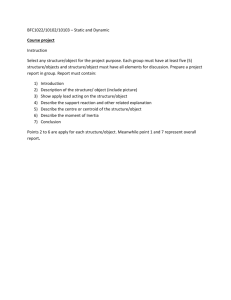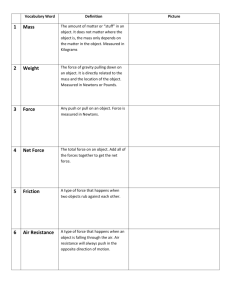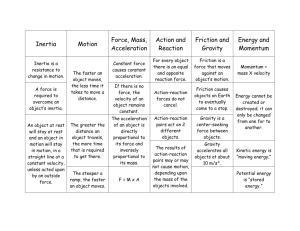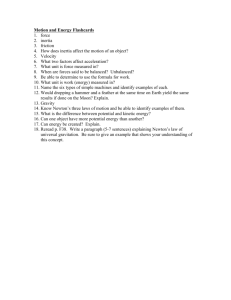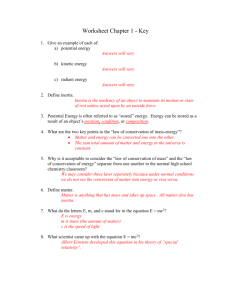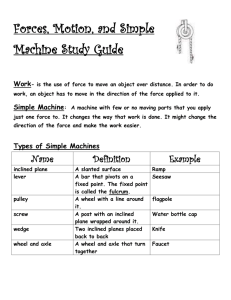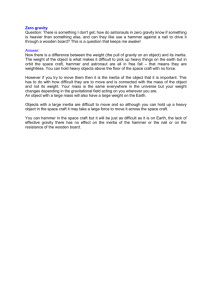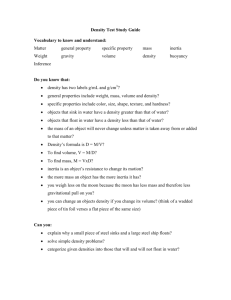5.3 Mass and weight
advertisement
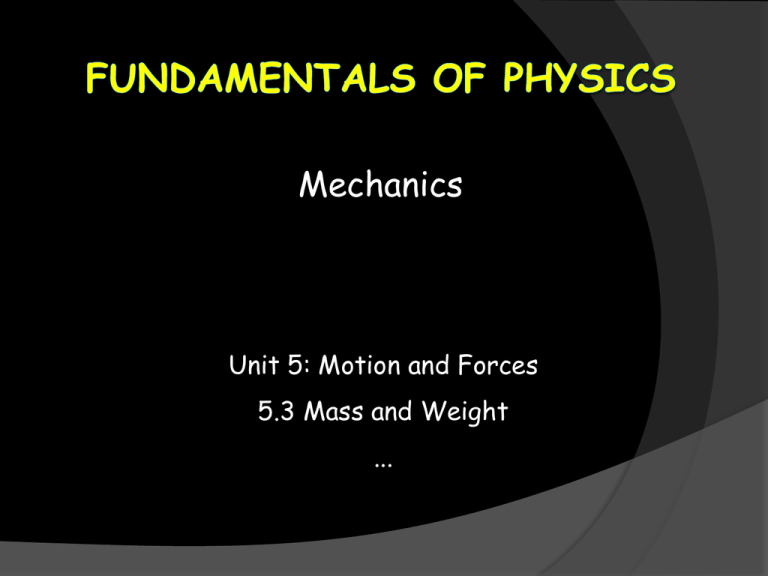
Mechanics Unit 5: Motion and Forces 5.3 Mass and Weight ... Fundamentals of physics - Mechanics Mass and Weight ---------------------------------------------------------------------------------------- MASS — A MEASURE OF INERTIA If an object is speeding up, slowing down, or changing course it is undergoing acceleration. It resists changing its motion and this is called inertia. The forces applied to it will determine how much it accelerates. The amount of matter in the object determines its inertia. If we could add up the masses of all the atoms in the object that would give us its mass. More matter means more inertia. The amount of matter an object contains is called its mass. The greater the mass of an object, the greater its inertia. In a material object, mass is a measure of its inertia. ... Fundamentals of physics - Mechanics Mass and Weight ---------------------------------------------------------------------------------------- MASS AND WEIGHT Some people confuse Mass and weight. Our experience is that more matter means more weight. But we define each as follows: Mass: The amount of matter in an object. It is also the measure of the inertia or resistance to: starting a stationary object moving or rotating it. stopping it, speeding it up, slowing it down or change the direction it is moving. Weight: The force upon an object due to gravity. ... Inertia isn’t a force... ... all matter resist changes in its motion.... ... A kind of laziness?... Fundamentals of physics - Mechanics Mass and Weight ---------------------------------------------------------------------------------------- Mass and weight have a direct proportion. Doubling the mass of an object doubles its weight and halving its mass is halves the weight. In mathematics it is acceptable to measure the weight (gravitational attraction to Earth) in objects by their mass (quantity of matter) but this is unacceptable in science. However mass is a fundamental quantity that doesn’t depend on gravity. Gravity on the Moon, for example, is 1/ that on Earth so you would weigh . 6 However on Jupiter Gravity on would be 2.3 times that on earth. ... Remember weight changes with gravity... But mass does not... Your weight will change if you go to other words or space... But your mass will be the same... Fundamentals of physics - Mechanics Mass and Weight ---------------------------------------------------------------------------------------- For every pound or kg on earth calculate your weight on different celestial bodies: ... A good way to loose weight... ... If lived on Mars you will weigh 2/5 that on earth... But will still have the same mass... Fundamentals of physics - Mechanics Mass and Weight ---------------------------------------------------------------------------------------- Weight is measured in a unit called Newtons (N). Mass is measured in a unit called kilograms (kg). Their relationship is: Weight (N) = Mass X acceleration due to gravity (ms-2) So if your mass is 50kg and acceleration due to gravity on Earth is 9.8ms-2. Then your weight is 50kg X 9.8ms-2 Weight = 450N. ... Demonstration of Inertia ... ... The magician promises that she can break the thread at A or at B at will... Fundamentals of physics - Mechanics Mass and Weight ---------------------------------------------------------------------------------------- Weight is measured in a unit called Newtons (N). Mass is measured in a unit called kilograms (kg). Their relationship is: Weight (N) = Mass X acceleration due to gravity (ms-2) So if your mass is 50kg and acceleration due to gravity on Earth is 10ms-2. Then your weight is 50kg X 10ms-2 Weight = 500N. A 1kg chicken weighs 9.8N Fundamentals of physics - Mechanics Mass and Weight ---------------------------------------------------------------------------------------- A slow, steady increasing downward force breaks the string above the massive ball at A, whereas a sudden jerk will break the lower string at B. Explanation: The tension on the string with the slow steady force at B is just the force applied whereas the tension on the string at A adds the weight of the ball to the applied force so since the tension at A is greater it will break there. When the string is jerked there is almost no tension at A as the inertia of the ball opposes its motion so it breaks at B... Fundamentals of physics - Mechanics Mass and Weight ---------------------------------------------------------------------------------------- This astronaut in outer space (beyond the solar system where gravity is negligible) will have to use the same force as he would on earth to move this anvil. If the anvil’s mass is 500kg and the astronaut is 100kg, what do you think will happen? What is the weight of the astronaut? What is the weight of the anvil? ... On the sun your weight would be 28 times that on earth... ... Better go there at night to avoid being burned... Fundamentals of physics - Mechanics Mass and Weight ---------------------------------------------------------------------------------------- Summary of Terms Force - a push or a pull. Inertia - The ability of objects to resist changes in motion. Kilogram - The unit of mass. One kilogram (kg) is the mass of 1 litre of water at 4oC. Mass - The amount of matter in an object. Technically, it is a measure of the inertia. Newton - The unit of force. Weight - the force of gravity on an object. ... A block of polystyrene is bigger than a steel ball... ... Which has more inertia? Which has more mass... Fundamentals of physics - Mechanics Mass and Weight ---------------------------------------------------------------------------------------- Testing the concept of Mass and weight... An astronaut in outer space finds the labels of two identical storage boxes have fallen off. One label reads log books and the other pillow foam. How can she determine which label applies to each box without opening them?
